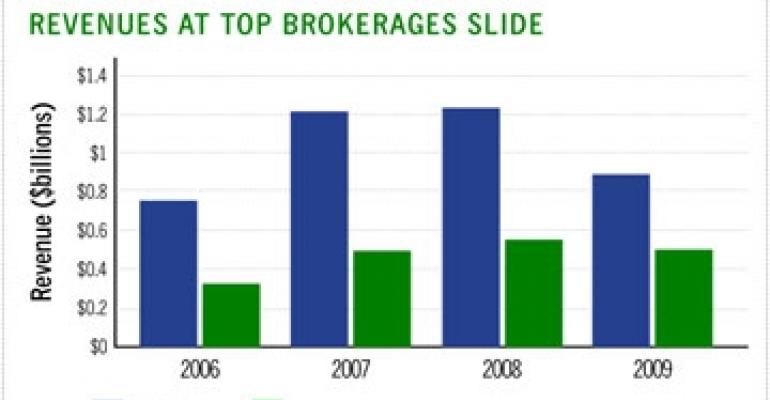Times are tough in brokerage land these days, forcing real estate service providers to make deep expense cuts and mine for future business in distressed properties. Confirmation of the challenging business climate came in the latest round of quarterly earnings releases from two of the largest publicly traded services firms.
First, Chicago-based Jones Lang LaSalle (JLL) announced that it lost $61 million, or $1.78 a share, in the first quarter of 2009 compared to a year ago. Revenue fell 12% to $494.2 million from $563.9 million in the same period. The next day, April 29, Los Angeles-based CB Richard Ellis (CBRE) said it lost $36.7 million in the first quarter, with revenue falling 26% to $890.4 million from $1.2 billion in first quarter 2008.

At the crux of the slide is a dearth of transactions. Slowed investment sales and companies holding off on leasing plans translate to lower revenues. According to New York-based research firm Real Capital Analytics, first quarter office building sales nationwide totaled just $3.6 billion. That is the equivalent of only 6% of the peak sales volume of $77.5 billion recorded in the first quarter of 2007.
As more properties and their owners become financially distressed, sales could climb. To date, however, the lack of deals has meant cutbacks and layoffs for every major services firm. Until transaction volume returns in a meaningful way, service providers have shifted to client advisory work and property management mode for the time being.
CBRE illustrated the point a day after its conference call. In a press release it trumpeted an annual survey by the International Association of Outsourcing Professionals, in which CBRE ranked as the highest commercial real estate services firm.
Lauralee Martin, chief financial officer for JLL, noted that requests for proposals from corporations to outsource their real estate services have doubled from a year ago. Still, the timing of the corporate work is uncertain as companies continue to evaluate and re-evaluate their space plans. “It is like a dam building up. At some point in time actions will need to be taken,” said Martin.
In a bid to bolster its own balance sheet, CBRE announced an additional $100 million in cost savings, adding to its previous cuts of $385 million. That move appeals to analysts who track the industry. “The company’s aggressive cost-cutting initiatives will help it mitigate the pressures on profitability,” says Brandon Dobell, an analyst with Chicago-based William Blair & Co. Based on its latest results, Dobell is now projecting CBRE to record $4.3 billion in 2009 revenue, down 15% from 2008.
JLL also is in a cost-cutting mode, chopping $100 million from its first-quarter expenses and dropping its dividend from 25 cents a share to only 10 cents a share. Dobell cut his full-year forecast of JLL’s 2009 revenue from $2.75 billion to $2.45 billion, thanks to $140 million in lower projected revenue in the Americas and a $160 million drop in revenue from Europe, the Middle East and Africa.
“You don’t hear us making overly optimistic noises about recovery,” said Colin Dyer, Jones Lang LaSalle’s CEO. “We are seeing some signs of improvement in the general business environment. Credit markets have eased. Capital is being raised again. But we are not planning our business on that. We are planning on markets to hold at their current relatively muted levels, which will give us a seasonal recovery, but we are not going back to 2007 anytime soon.”
In this environment, picking clear-cut winners and losers is a tough game. “CBRE’s commitment to aggressive cost cutting and geographic exposure has the company in the best position to benefit from a recovery in U.S. investment sales,” says Dobell. Still, both firms are likely to make strides in the months ahead. “We continue to believe that current valuation levels will offer patient investors a great opportunity in both CBRE and JLL. We maintain our outperform ratings for both CB Richard Ellis and Jones Lang LaSalle.”
Just one week after their earnings releases in late April, shares in CBRE and JLL jumped 21% and 16%, respectively, by May 6.

